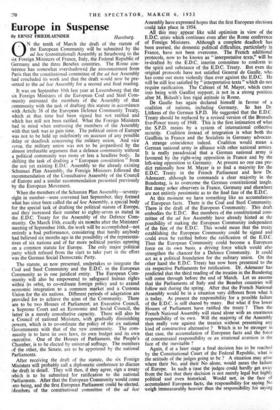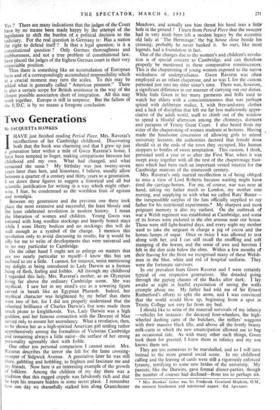Europe in Suspense
By ERNST FRIEDLAENDER
. Hamburg.
ON the tenth of March the draft of the statute of the European Community, will be submitted by the ad hoc (constitutional) Assembly at Strasbourg to the six Foreign Ministers of France, Italy, the Federal Republic. of Germany and the three Benelux countries. The Rome con- ference has somewhat overshadowed She announcement from Paris that the constitutional committee of the ad hoc Assembly had concluded its work and that the draft would now be pre- sented to the ad hoc Assembly for a second and final reading.
It was on September 10th last year at Luxembourg that the six Foreign Ministers of the European Coal and Steel Com- . munity entrusted the members of the Assembly of that community with the task of drafting this statute in accordance with Article 38 of the European Defence Community Treaty, which at that time had been signed but not ratified and which has still not been ratified. What the Foreign Ministers had in mind when entrusting the members of the Assembly with that task was to gain time. The political union of Europe* was not to be held up indefinitely on account of any possible delay or deadlock concerning the military union. And vice versa, the military union was not to be jeopardised by the almost irrefutable argument that a defence community without a political community was more or less a headless body. In shifting the task of drafting a " European constitution ' from the not yet existing E.D.C. Assembly to the already existing Schuman Plan Assembly, the Foreign Ministers followed the recommendation of the Consultative Assembly of the Council of Europe and a similar recommendation presented previously by the European Movement.
When the members of the Schuman Plan Assembly—seventy- eight in number—were convened last September, they formed what has since been called the ad hoc Assembly, a special body for the special task of drafting the political statute of Europe, and they increased their number to eighty-seven as stated in the , E.D.C. Treaty for the Assembly of the Defence Com- munity. On March 10th, exactly six months after the Ministers' meeting of September 10th, the work will be accomplished—not entirely a bad performance, considering that hardly anybody had believed six months ago in the possibility of the representa- tives of six nations and of far more political parties agreeing on a common statute for Europe. The only major political party which refused from the start to take part in the effort was the German Social Democratic Party.
The statute, as now presented, undertakes to integrate the Coal and Steel Community and the E.D.C. in the European Community as in one juridical entity. The European Com- munity will also be empowered to safeguard human rights within its orbit, to co-ordinate foreign policy and to extend economic integration to a common market and a Customs Union for the six nations. Different periods of adaptation are provided for to achieve the aims of the Community. There are to be two Houses of Parliament, an Executive Council, a Supreme Court and -an Economic and Social Council, the latter in a merely consultative capacity. There will also be a Council of national Ministers, with gradually diminishing powers, which is to co-ordinate the policy of the six national " Governments with that of the new community. The con- - munity is to have its own laws, its own budget and its own executive. One of the Houses of Parliament, the People's Chamber, is to be elected by universal suffrage. The members of the other, the Senate, are to be appointed by the national Parliaments.
After receiving the draft of the statute, the six Foreign Ministers will probably call a diplomatic conference' to discuss the draft in detail. They will then, if they agree, sign a treaty which is to be submitted for ratification to the national Parliaments. After. that the European Community would come _nto being, and the first European Parliament could be-eleeted. Members of the constitutional committee of the ad- hoc Assembly have expressed hopes that the first European elections could take place in 1954.
All this may appear like wild optimism in view of the E.D.C. crisis which continues even after the Rome conference of Foreign Ministers. Although a complete deadlock has been averted, the domestic political difficulties, particularly in France, have not been overcome. The French additional protocols, now to be known as " interpretative texts," will be re-drafted by the E.D.C. interim committee to conform to the spirit and substance of the E.D.C. Treaty. But even the original protocols have not satisfied General de Gaulle, who has come out more violently than ever against the E.D.C. He will be still less satisfied by " interpretative texts " which do not require ratification. The Cabinet of M. Mayer, which came into being with Gaullist support, is not in a strong position after M. Bidault's less rigid attitude in Rome. De Gaulle has again declared himself in favour of a coalition of nations, including Germany. So has Dr.
Ltitkens of the German S.P.D. He suggested that the E.D.C.
Treaty should be replaced by a revised version of the Brussels five-Power treaty of 1948. This is the first intimation of what the S.P.D. means by a system of international collective security. Coalition instead of integration is what both the Gaullists in France and the Socialists in Germany advocate.
A strange coincidence indeed. Coalition would mean a German national army in alliance with other national armies. It is really paradoxical that a German national army is favoured by the right-wing opposition in France and by the left-wing opposition in Germany. At present no one can pre- dict rationally how M. Mayer is to find a majority for the E.D.C. Treaty in the French Parliament and how Dr. Adenauer, although he commands a clear majority in the Bundestag, is to overcome the German constitutional tangle. But many sober obseri,ers in France, Germany and elsewhere are not entirely pessimistic as to the final fate of the E.D.C.
At this moment we have something like an accumulation of European facts. There is the Coal and Steel Community. There is the draft of the European Community. This draft embodies the E.D.C. But members of the constitutional com- mittee of the ad hoc Assembly have already hinted at the possibility of making the European Community independent of the fate of the E.D.C. This would mean that the treaty establishing the European Community could be signed and could even be ratified before the ratification of the E.D.C.
Thus the European Community could become a European force on its own basis, a driving force which would also strengthen the chances; for a Defence Community. It could act as a political foundation for the military union. On the other hand the E.D.C. Treaty has now been presented to the six respective Parliaments for ratification. 'Dr. Adenauer has predicted that the third reading of the treaties in the Bundestag will come through before the end' of March. Let us assume that the Parliaments of Italy and the Benelux countries will follow suit during the spring. After that the French National Assembly would be in a situation very different from what it is today. At present the responsibility for a possible failure of the E.D.C. is still shared by many. But what if five lower Houses of Parliament have ratified the treaty Then the French National Assembly will stand alone with an enormous responsibility of its own. Will the majority of the Assembly then really vote against the treaties without presenting any kind of constructive alternative ? Which is to be stronger in that case, the accumulation of European facts and the force of concentrated responsibility or an irrational aversion in the face of the inevitable ?
Again, if at a later stage a final decision has to be reached by the Constitutional Court of the Federal Republic, what is the attitude of the judges going to be ? A situation may arise where their No, and - their No alone, would mean the failure of Europe. 'In such a ease the judges could hardly get away from the fact that their decision is not merely legal but highly political and even historical. Would not, in the face of accumulated European facts, the responsibility for saying No weigh immeasurably heavier Than the responsibility for saying
Yes ? There are many indications that the judges-of Court have by no means been made happy by the attempt of the legislature to shift the burden of a political decision to the judiciary. For the real question in Germany is: Has a nation the right to defend itself ? Is that a legal question; is it a constitutional question ? Only German thoroughness and stubbornness, and not a true problem of constitutional law, have placed the judges of the highest German court in their very unenviable position. Thus there is something like an accumulation of European facts and of a correspondingly accumulated responsibility which at a crucial moment may turn the scales. To this may be added what is generally called " American pressure." There is also a certain scope for British assistance in the way of the closest possible association short of integration. All this may work together. Europe is still in suspense. But the failure of the E.D.C. by no means a foregone conclusion.



































 Previous page
Previous page